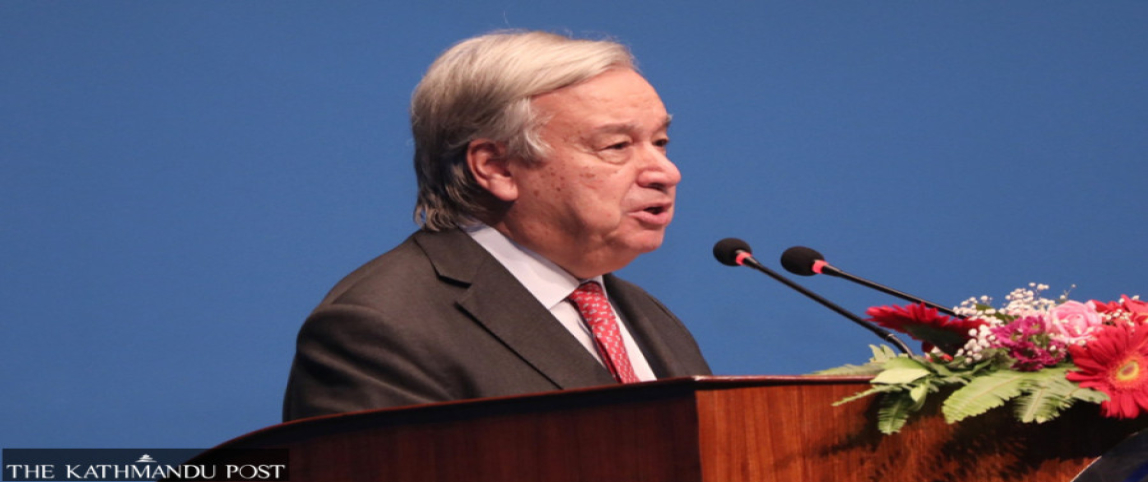Justice Must be at the Heart of Nepal Peace Process, says UN chief Gutierrez
BINOD GHIMIRE / The Kathmandu Post, Nepal | 01/11/2023
Text Size:
Visiting United Nations Secretary General Antonio Guterres has reminded Nepali authorities that transitional justice is a complex process that will be considered successful only if it has victims at its heart.
Addressing a joint meeting of the federal parliament on Tuesday, the chief of the global multilateral organisation said the transitional justice process must be “inclusive [and] comprehensive with victims at its heart”.
He added that while truth and reparations are important, justice is also an inevitable part of the process. His statement comes at a time when the current ruling coalition is saying it is largely a reconciliatory process where truth-seeking, relief and reparation should get more importance over other pillars.
“We know that transitional justice has the greatest chance of success when it is inclusive, comprehensive and has victims at its heart,” Guterres said. “When it centres on truth and reparations but also justice. When women participate fully. And when all victims of human rights violations can find meaningful redress.”
Transitional justice—a crucial component of Nepal’s peace process—together with climate change has been the core subject of Guterres’s interest in his four-day trip that began Sunday.
In his address, he further mentioned that the process must help bring peace to victims, families and communities haunted by questions and scarred by injustice and help put the past to rest. Even as 17 years have passed since the peace process began in 2006, thousands of conflict victims are still fighting for justice.
Hours before his address, a group of victims, backed by civil society members, staged a demonstration in Babarmahal area of the Capital demanding a revision of the Enforced Disappearances Enquiry, Truth and Reconciliation Commission Act keeping victims at the centre and establishment of a credible process that wins the trust of all stakeholders. A bill to amend the Act awaits Parliament’s approval.
The UN chief also said the transitional justice process must meet international standards and the Supreme Court rulings, as demanded by victims.
“You are not alone,” he said. “The United Nations stands ready to support you to develop a process that meets international standards, your Supreme Court’s rulings, and the needs of victims—and to put it into practice. The United Nations and Nepal are old friends.”
Along with transitional justice, he touched on several issues including climate change, Nepal’s contribution to the UN peace missions, digital divide, responsibilities of the big nations to smaller countries, and the humanitarian crisis the Israel-Hamas war has invited.
Having witnessed the catastrophe climate change has brought to the Himalayas in his visits to the Mount Everest and Mount Annapurna regions, Guterres said Nepal was facing huge consequences of the climate change despite its negligible contribution to global emissions.
“What is happening in this country as a result of climate change is an appalling injustice and a searing indictment of the fossil fuel age. I am deeply concerned by those communities in Nepal facing the brutal impacts of the climate crisis. The United Nations stands with them,” he said, highlighting how monsoons, storms and landslides are growing in force and ferocity—sweeping away crops, livestock and entire villages—decimating economies and ruining lives. He also claimed that the glaciers in Nepal are melting at record rates leading to a loss of one third of them in just three decades.
Guterres said Nepal and other developing countries need far greater international support to help development, accelerate climate action, and weather the current global storms.
“I have proposed an SDG Stimulus that would release at least $500 billion a year in affordable long-term finance for sustainable development and climate action,” he said. “Developed countries must honour the promise of $100 billion a year; and double adaptation finance, as a first step to devoting half of climate finance to adaptation. The most vulnerable must be at the centre of efforts to build climate resilience.”
Through Nepal’s Parliament he also urged leaders to act on climate without delay—with the biggest emitters leading from the front saying all countries must put the Acceleration Agenda I have proposed into effect, to limit the rise in global temperature to 1.5 degrees Celsius.
He appreciated Nepal’s role in climate action, claiming it was on target to reach net zero emissions by 2045 and carrying out extraordinary reforestation efforts. Nepal has made remarkable progress in increasing the forest cover with its successful community forestry programme.
Echoing the concerns of the developing nations, Guterres said these countries must have far greater representation in international institutions. I have called for reform of the outdated United Nations Security Council and proposed measures to reform the global financial architecture—so that it better represents developing countries and responds to their needs, he said.
“These proposals are gaining real traction—at this year’s United Nations General Assembly and beyond. The United Nations Summit of the Future next year is an important chance to push further progress. I count on Nepal’s support to help make the change we need a reality,” he said.
On several occasions he said that Nepal and the United Nations were good friends, and he would work to ensure developing nations like Nepal are heard in global multilateral forums. As geopolitical tensions rise, global divisions are becoming deeper and more dangerous and smaller countries fear becoming collateral damage in competition between great powers, according to Guterres.
Stating that Nepal sets an example to the world on different fronts, he said, “This country is a promoter of peace, a champion of multilateralism, and a staunch supporter of sustainable development and climate action.”
The article was first published in The Kathmandu Post, Nepal
















